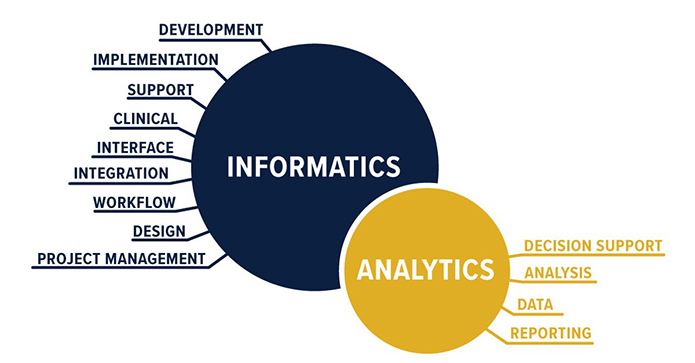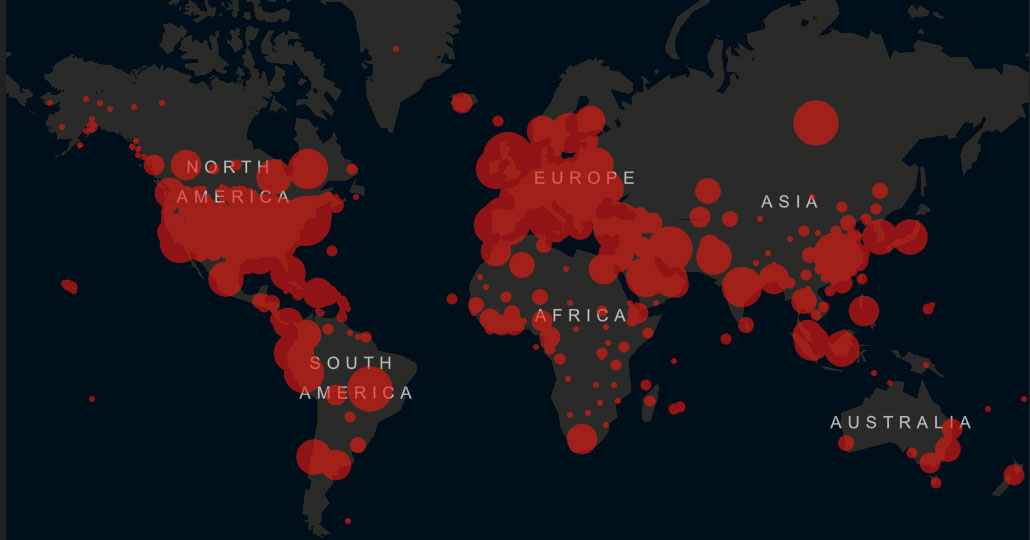One thing we can all be certain of: after the disruption caused by COVID-19, healthcare is not going to be the same. Technologies like telemedicine are here to stay and grow, and artificial intelligence is becoming indispensable to predict the evolution of pandemics and help find vaccines and cures.
Health informatics specialists during the past five years have been increasingly involved in the improvement of quality, safety, outcomes, and cost-effectiveness of healthcare delivery. These professionals play vital roles in the healthcare industry. The graphic below depicts possible roles health informatics professionals play in moving forward the technology that supports healthcare:

COVID-19 has pressed direct care providers and the health technologies that support them, requiring a massive update to many health technology systems. Below are some of the ways these systems have been impacted by the pandemic showcasing the key roles health informatics professionals play as healthcare evolves to a “new normal”:
Screening Protocols
Social distancing has impacted how patients connect to care. Now hospitals are faced with new variables and risks. Health IT teams are defining the system's needs to support decision-making processes, document workflows, and protocols.
At the start of the patient experience, COVID is creating demands on patient intake and routing. There are new rules related to:
- Triage of patient phone calls
- Registration and screening questions for all patients
System-Level EHR Templates
COVID-19 has placed increasing requirements on the electronic health records and related systems. These systems are subject to significant updates. Health IT specialists will be part of these projects involving designing new modules, collecting the latest system requirements, and generating new interfaces and workflows. These systems will be adapted in new ways of:
- Managing patient concerns to promote the efficiency with and key information to with providers
- Distributing home isolation instructions
- Screening and treating patients in ambulatory care and also urgent care settings. Indeed, system guidance regarding such things as who should be in ICU and discharged are changing rapidly in light of new knowledge and complexities COVID patients are experiencing. Health informaticians are called to make these rapid changes in supporting systems.
Inpatient, Emergency and Ambulatory Departments
Once a patient is accepted into a healthcare facility, many concurrent processes are going on to ensure their safety, testing, diagnostic, treatment, and discharge. For example, doctors need to decide who needs lab testing and the appropriate test. Health technologies such as artificial intelligence tools can help to provide insight in such ways as detecting signs of COVID-19 in CT scans.
To support these processes, health IT teams collect and organize data and use statistics to help with decisions, including: who needs testing, who needs isolation orders, which providers need protective equipment, and what is the proper way to collect a specimen.
In looking forward, the quick introduction of AI tools to findings on how to fight the coronavirus might raise questions around accuracy, bias, discrimination, safety, and privacy. Fever detection, facial recognition, and other forms of remote biometric identification technology can collect sensitive data. Health informatics specialists play a crucial role in ensuring that data is handled and organized correctly, as well as reported to facilitate understanding.
Reporting and Analytics
Data visualization and reporting are critical elements in the assessment and decisions made regarding the COVID-19 pandemic. Some of the tasks that health informatics and analytics professionals do to support these decisions are:
- Creating new reports
- Creating dashboards (public and internal)
- Designing databases
- Updating the systems to drill down on the data
- Identifying and connecting data sources
Communication Channels
Electronic health records are transmitted through various communication channels – this is health information exchange. Health information exchanged can relate to just one patient, where past history or current findings may be shared among providers. It can also include information sent about many patients for surveillance or discovering more about how to care for groups of patients or even the population. Access to real-time data is a critical requirement for medical and community decision-makers. Health IT staff are at the core of supporting this information exchange – for example, information sent between healthcare institutions and the Center for Disease Control (CDC) or third-party vendors, all while ensuring security and privacy.
Patient Facing Technology
COVID-19 put forth a need for long-distance patient contact, testing, diagnosis, and treatment. Countries like Israel already offer in-home medical exams, using AI to deliver clinical-grade data to remote doctors for diagnosis. Telemedicine (care by a provider from a distance) is an important service that has grown exponentially during COVID-19.
Hospitals are expanding their telecommunications infrastructure to support or improve their telemedicine capabilities. Accommodating the new flood of patients seeking virtual care has been a challenge for both small practitioners and larger telemedicine providers alike. It is clear there is additional effort required for telemedicine to have a “perfect fit” in the standard course of care. To support the development of telemedicine, health IT professionals will engage in:
- Setting the architecture of telehealth software
- Identifying the hardware requirements
- Optimizing workflows
- Designing tools for help
- Designing databases to collect data from at-home monitoring devices
- Evaluating outcomes
The Future of Healthcare
The health industry is shifting from responding to illness to sustaining well-being. This new paradigm involves a major digital transformation that will be enabled by refined data processing capabilities and secure platforms. Health IT and analytics teams are playing a crucial role in the healthcare transformation, and their work demands a deep understanding of healthcare, business, and information technology.

